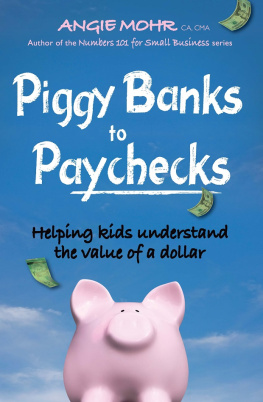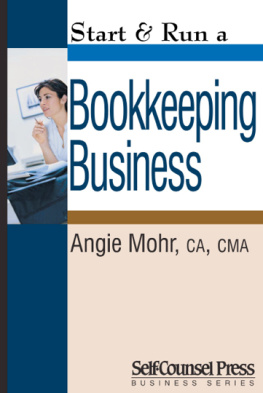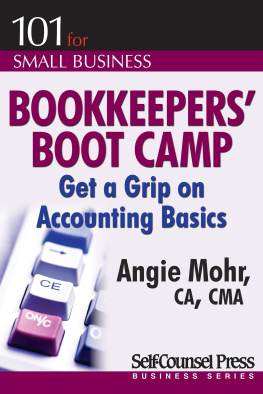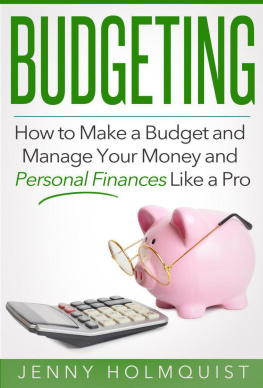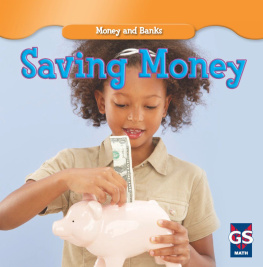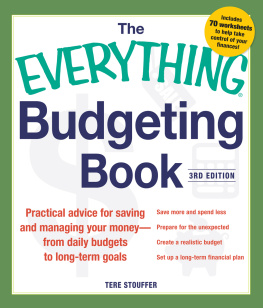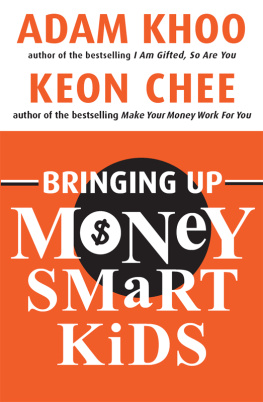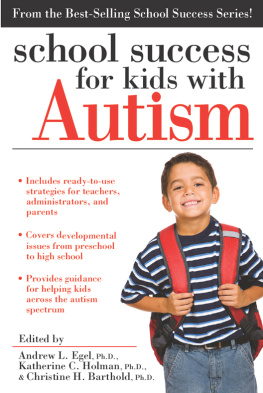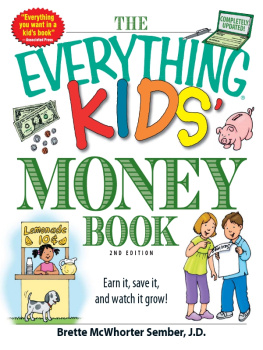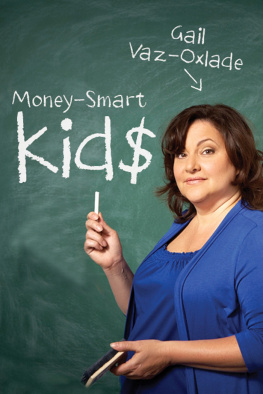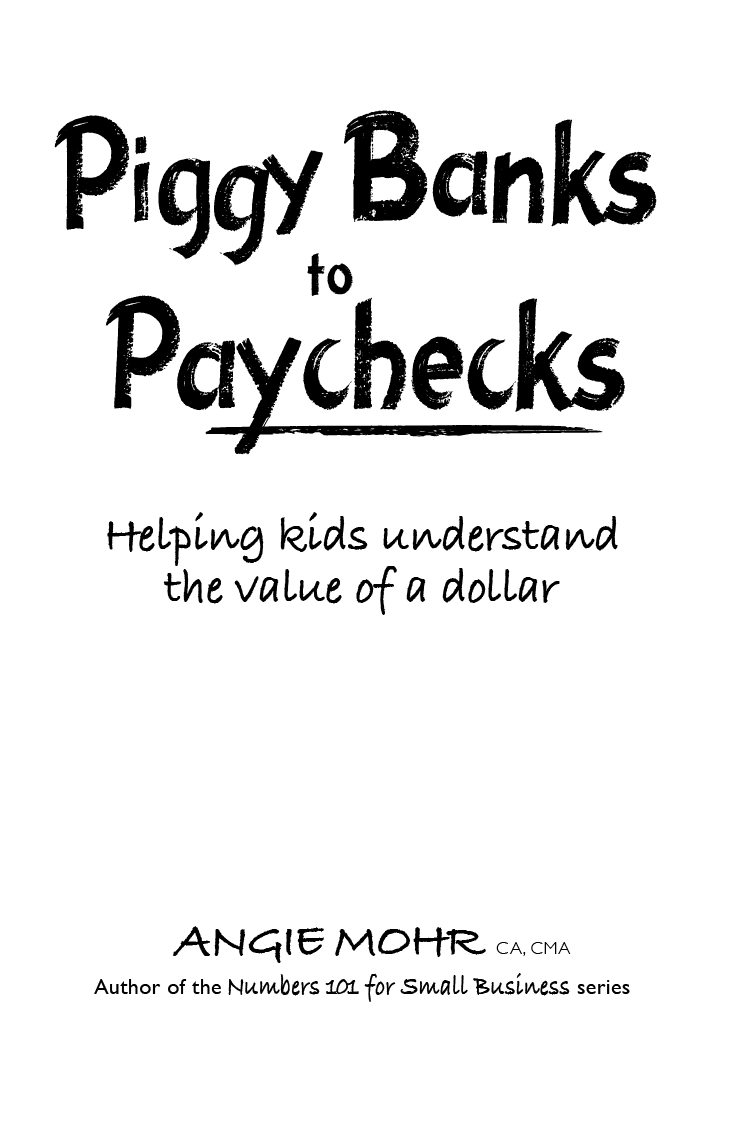Acclaim for
piggy banks to paychecks
Whether you deal with numbers every day like I do or are afraid of math, if you have kids, you need this book. It will give you the tools and techniques you need to set them well on their way to a satisfying life of money well spent.
~ David Trahair, author of Get Off Your Assets: Erase Debt, Save Cash, Retire Rich
Education and learning can be two vastly different things. An education about money and finances can be imposed on you from all aspects of life, from formal classes at schools, to the ups and downs of the economic markets, to how you negotiate your first lunch trade at primary schoolLearning these life skills is essential to the well being of any individual. Mohr offers a wonderful, easy-to-read book that provides a family-friendly approach to finances for both parents and teachers to help kids build a solid financial foundation. It promotes life long learning and a great guide to supporting financially literate children. I strongly recommend it.
~ Dr. Alison Sammel, School of Education and Professional Studies, Griffith University, Queensland, Australia
copyrightright 2012 Angie Mohr
Published in Canada by Fitzhenry & Whiteside,
195 Allstate Parkway, Markham, ON L3R 4T8
Published in the United States by Fitzhenry & Whiteside,
311 Washington Street, Brighton, Massachusetts 02135
All rights reserved. No part of this book may be reproduced in any manner without the express written consent of the publisher, except in the case of brief excerpts in critical reviews and articles. All inquiries should be addressed to Fitzhenry & Whiteside Limited, 195 Allstate Parkway, Markham, Ontario, L3R 4T8.
www.fitzhenry.ca godwit@fitzhenry.ca
Fitzhenry & Whiteside acknowledges with thanks the Canada Council for the Arts, and the Ontario Arts Council for their support of our publishing program. We acknowledge the financial support of the Government of Canada through the Canada Book Fund (CBF) for our publishing activities.
Library and Archives Canada Cataloguing in Publication
Mohr, Angie
Piggy banks to paychecks : helping kids understand the value of a dollar / Angie Mohr.
Includes bibliographical references and index.
eISBN 978-1-55455-881-0, print 978-1-55455-210-8
1. Children--Finance, Personal. I. Title.
HG179.M575 2011 332.0240083 C2011-907144-4
United States Library of Congress Cataloging-in-Publication Data
Mohr, Angie
Piggy banks to paychecks : helping kids understand the value of a dollar / Angie Mohr.
[ ] p. : ill. ; cm.
Includes bibliographical references and index.
Summary: A practical approach for parents to help their children learn the critical money skills, such as earning and saving money, budgeting, understanding taxes, and running a business. Each chapter tackles a different skill; and includes worksheets and checklists to help parents and children.
ISBN: 978-1-55455-210-8 (pbk.)
1. Children Finance, Personal . I. Title.
332.0240083 dc23 PHG179.M647 2011
Dedication
This book is dedicated to all of the parents out there who stay up late at night worrying about their finances and about how their children will fare in the financial world of the future. There is a path forward, no matter what your current situation. Giving your children the gift of a financial education is important, if not always glamorous. You have the will and, now, the tools to ensure that they grow up money smart. My best to your family!
Notice to Readers
The basic principles of money and financial security never change. However, laws and economic realities constantly do. Although every effort is made to ensure that the information contained herein is accurate and current, neither the publisher nor the author can guarantee specific results from its use. Its always wise to consult a financial professional before undertaking major financial changes.
Please be sure to have the most current edition of this book.
Acknowledgments
There are so many people who recognize the importance of this topic and were ardent supporters of this book right from the beginning.
I would like to start by thanking my publisher, Fitzhenry & Whiteside, for performing the role of midwife to the book. Also, huge thanks to my agent, Hilary McMahon, of Westwood Creative Artists.
There are many people who work incredibly hard in the service of teaching financial literacy. So many parents, teachers, and other mentors take the time to share the financial basics with children, who will grow up to be money-wise adults. I am also grateful to others who work to officially change the way financial literacy is taught in schools and offered to adults. In particular, I would like to thank Donald Stewart and Evelyn Jacks of Canadas federal Task Force on Financial Literacy and Gail Vaz-Oxlade, Ellen Roseman, and David Trahair who continue to help consumers destroy debt, invest wisely, and lead fiscally calm and immensely satisfying lives.
I also have such deep gratitude to those from across North America who shared their personal family money stories with me and with all of the readers of this book. Their candid stories appear throughout the book.
Lastly, I want to thank my children, Alex and Erika, for being willing participants in our familys financial teaching travails. And, no, this doesnt mean your allowance is going up.
Real Money Stories 1
Lynns Story
I think I have taught my children quite a bit of financial knowledge. They both know the importance of saving and budgeting. On my daughters 18th birthday, we started an RRSP for her and plan to do the same for my son when he turns 18. Im sure there will be things that come along in the future that I will wish I had told them, but, for now, I think they both have a very educated understanding of money.
My children never really had an allowance growing up. They knew that not every shopping trip was a trip for them to come home with something. Once in awhile they were treated if their behavior was acceptable. As they got a bit older, they were given money as needed-e.g., if their friends wanted to go to the movies or out for food, etc. Money was not thrown around frivolously by any means, but neither of my children wanted for much and, luckily, both have come to appreciate the freedoms they were allowed.
Each of my children had a savings account opened for them shortly after birth. Any money from birthdays, Christmas, and the Government went into these accounts. Once they were old enough to get a job, I asked them to put some of their paychecks into this account each payday. I told them it did not have to be a lot, but the more they put into the account, the more it would benefit them later on.
My daughter babysat from time to time, but both of my children got actual jobs at the age of 16. My daughter kept the same job until she went off to college. My son just turned 16 and has acquired his first part-time job this summer. So far, so good for him.
My husband and I differ in our opinions about whether our kids would be allowed to move back in with us when they get older. I love my children to death and always want them to be around. He believes that you should be out on your own at 18 or so. We do agree on the idea that if you have to move back in but are going to school, there will be no rent, but you will help around the house. If you have a job and need a place to stay while you save up for your own, then some rent will be put in place as well as still helping out around the house. My children have always been very good with their money. My daughter, being the thriftier one, would comparison shop, wait for sales, or hope Mom would buy it out of niceness. Her spending would be on smaller items such as clothing and aesthetics. My son always has his eye on the BIG things and would/will save his money until he has enough for that one special purchase.

